Front Porch Blog
The Tennessee Valley Authority is the country’s largest federal utility, but most people outside of its seven-state service area are probably not aware of how they will be affected by this unregulated utility’s bad actions. TVA is currently ignoring federal climate goals for a 100% carbon-free energy sector by 2035 to push forward a plan for the second-largest fossil fuel buildout of any utility in the country. These plans will line the pockets of two mega gas corporations, fuel climate change and devastate southeastern habitat and public health.
You might be wondering how TVA could be allowed to act so unilaterally. Unlike investor-owned utilities, TVA’s energy generation and ratemaking plans are not regulated by a state public utilities commission. Nor are these decisions regulated by Congress. Instead, a nine-member board of directors is appointed by the president and confirmed by the U.S. Senate to make major decisions about how the Tennessee Valley Authority operates. But since May 2021, the board has deferred some of those major decisions to a single person: CEO Jeff Lyash. Earlier this year, Lyash issued a record of decision to build a major methane-gas power plant that will need 32 miles of new gas pipeline to replace a retiring coal plant in Cumberland City, Tennessee. Lyash is currently on deck to decide whether another gas plant and 122 miles of additional pipeline should be built to replace the Kingston coal plant.
Tell FERC: No unnecessary Middle Tennesseee pipeline!
TVA’s justification for these plans is that so-called “natural gas” (which is almost entirely methane) will serve as a “bridge fuel” that will allow the utility to eventually add more renewable energy to its portfolio — currently, only 3% of TVA’s power comes from wind and solar. But in reality, there are affordable renewable options available now that would create significantly more jobs, strengthen electricity reliability and avoid three decades of powerful, climate-warming emissions that would result from TVA’s proposed gas buildout.
With six new TVA board members in place and several ongoing environmental reviews happening around the gas proposals, TVA could still decide to choose cleaner, reliable and affordable electricity generation options instead of gas.
Here are five reasons why TVA should throw out its dystopian gas plans, and how you can take action.
Reason #1: TVA’s gas plans are bad for local ecology
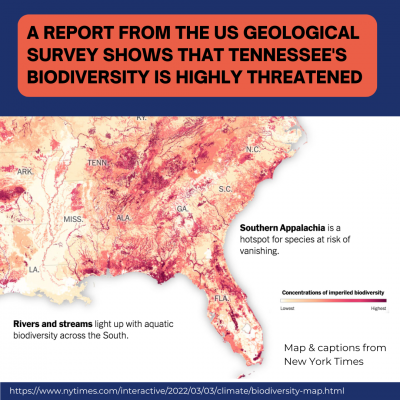
The risks associated with pipeline construction include increased greenhouse gas emissions, habitat destruction and fragmentation, exotic species invasion, water pollution, erosion, stream rerouting, loss of riparian vegetation and accidents and explosions. Pipeline companies Enbridge (Kingston route) and Kinder Morgan (Cumberland route) have identified long lists of endangered or threatened species that could potentially be in the path of the pipelines. Importantly, TVA’s actions could also affect bat species that have or will soon be added to the Endangered Species List, such as the Northern Long Eared and Tri-Colored bats.
Long lists of state or federally threatened species that could potentially occur within the project areas include:
Cumberland Project:
- Plants such as Price’s Potato Bean and Short’s Bladder Pod
- Aquatic species like Rabbits Foot and Tan Riffleshell Mussels
- Eastern Gray, Northern Long-Eared and Tri-Colored Bats
Kingston Project:
- Fish such as Spotfin Chub and Yellowfin Madtom
- Amphibians such as the Hellbender
In addition to ecological impacts, important geological resources are also at risk. For instance, the Kingston pipeline would run through the Flynn Creek Impact Crater, which is considered to be one of the best-preserved impact craters in the world and contains a rare cave in the central uplift of the crater. The site was also used by NASA to practice for the 1969 moon landing.
Reason #2: It’s bad for the local economy
Last summer, households in the TVA region paid electric bills that were as much as 16% higher because of TVA’s increased gas costs. While methane gas prices are notoriously unstable, the Energy Information Administration has predicted that they are likely to remain high this winter.
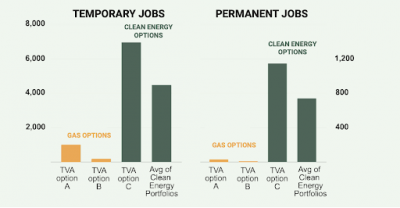
So far, TVA has NOT included key funding opportunities for renewables in its economic analysis for how to replace its coal plants. A recent study by the Rocky Mountain Institute found that, when factoring in federal funding from the Inflation Reduction Act, clean energy is cheaper than 90% of proposed gas plants. The Environmental Protection Agency told TVA that its economic analysis for replacing the Cumberland Plant was FAULTY because it relied on inaccurate underlying economic information and because it omitted these federal funding opportunities.
Reason #3: It’s devastating for the climate
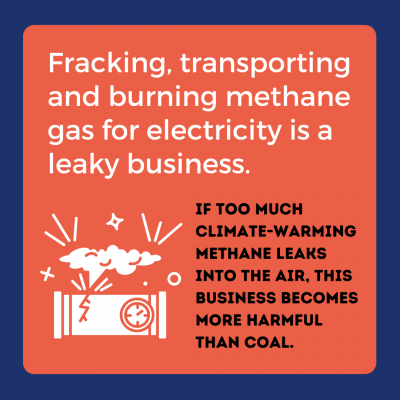
TVA is also planning the second-largest methane gas plant build-out of any other utility in the country at 5,000 megawatts. Gas plants, while generally less polluting than coal, emit several harmful pollutants including methane, a greenhouse gas that warms the planet 80 times more than carbon dioxide over a 20-year period. Fracking, transporting and burning methane gas for electricity is a leaky business, and if too much climate-warming gas leaks into the air, methane gas as an electricity source becomes more harmful to the climate than coal.
The break-even point, or the point above which methane gas would actually hurt the climate more than coal, has been estimated by different researchers to fall at a 3.2% to 4.9% methane leakage rate. Some studies are finding leakage rates for methane gas production to be well above even high estimates for the break-even point. This recent report in the New Mexico Basin calculated methane leaks at 9.4%.
Reason #4: It’s bad for health and environmental justice
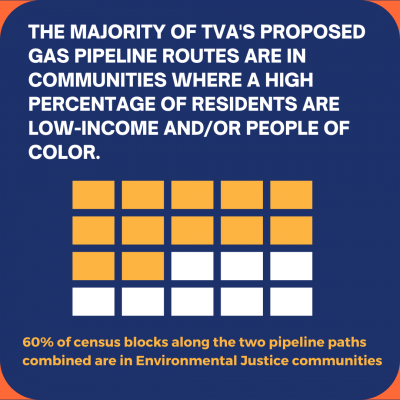
TVA’s gas plants would continue to burden these communities with the negative effects of industrial fossil fuel emissions because they emit toxic pollutants such as carbon monoxide, carbon dioxide, sulfur dioxide, nitrogen oxides, particulate matter and other nasty substances. These toxins can aggravate or cause respiratory disease, among other negative effects to vital organs. Particulate matter pollution is deadly and known to disproportionately impact low-income communities and communities of color. Recent research has shown that eliminating air emissions from electricity fuels, including gas, could prevent as many as 5,000 to 11,000 premature deaths each year.
In addition to these impacts from the proposed gas plants, the majority of census blocks found along TVA’s proposed gas pipeline routes are in communities where a high percentage of residents are low-income and/or people of color. The construction of these pipelines, which would involve the crossing of more than 680 streams and wetlands, can lead to stream sedimentation, pollution from possible fuel leaks during construction, and, in some cases, blasting during pipeline construction can cause streams to reroute or go underground. These risks jeopardize drinking water sources along both pipeline routes. In Dickson County, which would be crossed by the Cumberland Pipeline, an estimated 20% of residents rely on well or spring water.
Historical and culturally significant places for Indigenous people and communities of color are also threatened by these pipelines. For instance, the Cumberland Pipeline would run next to the Promise Land community and historic land, which was established by formerly enslaved people during the Reconstruction Period. The pipeline to feed the proposed Kingston gas plant would cut through regions with many Indigenous historical sites.
Reason #5: There are better options!
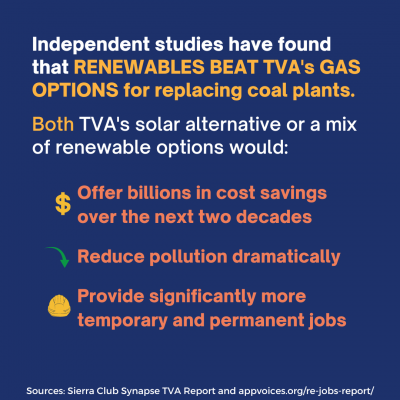
Currently, TVA has only included one renewable option (utility scale solar and storage) in its analysis for replacing the Cumberland Fossil Plant. Advocates and the EPA have called on TVA to include an alternative that involves a mix of wind, solar, battery storage, energy efficiency and demand response. An independent study from Synapse Energy Economics has shown that this mix of renewables, called a “Clean Energy Portfolio,” would maintain the same level of reliability as a gas plant while saving customers more than $5 billion dollars over the next 20 years. As mentioned above, Appalachian Voices’ study showed that a clean energy portfolio would add 20 to 30 times more permanent jobs than a gas plant at Cumberland.
TVA is already struggling to maintain the reliability of its gas plants. On Christmas Eve 2022, the federal utility issued rolling electricity blackouts across the service area to prevent catastrophic grid failure during frigid temperatures. The culprit? Multiple gas and coal plants failed to perform because of parts freezing, even after TVA had already attempted to prepare these plants for the anticipated winter storm.
Data showed that during these gas and coal plant failures, TVA’s solar facilities performed strongly. Unfortunately, only 3% of TVA’s current power supply comes from solar and wind, and only 1% of TVA’s portfolio comes from energy efficiency. Increasing these renewable and energy efficiency resources will help reduce the strain on TVA’s power grid and improve reliability by diversifying TVA’s energy mix with more abundant, renewable resources.
What can I do to stop these bad plans and push for a cleaner TVA?
If you’re fired up about TVA’s bad decision-making and ready to stop these gas plants and pipelines, get involved with the Clean Up TVA coalition, who will keep you up to date with the latest ways to take action. Also consider calling or emailing your state and congressional representatives to tell them you are opposed to TVA’s plans.
If you are local to either the Kingston or Cumberland plant or along either of the proposed pipeline routes, contact Appalachian Voices field organizers to be put in touch with your neighbors who are fighting these projects.
Cumberland plant/pipeline route:
Angie Mummaw
angie.mummaw@appvoices.org
Kingston plant/pipeline route:
Gabi Lichtenstein
gabi@appvoices.org
The good news is that many communities have beaten pipelines and gas plants — even after construction has already begun. As long as communities keep pushing back, they can win.
PREVIOUS
NEXT
Related News

Leave a comment
Your email address will not be published. Required fields are marked *
One response to “Five reasons why the Tennessee Valley Authority’s plans for a major gas buildout must be stopped”
-
Let’s stop ruining our planet with the polluter corporations greed. They don’t care about the inhabitants of the areas that they are polluting. Do any of the CEO’s live in the areas that they are destroying? NO! It is time for all corporations take responsibility for the areas that they are ruining. They need to live in those areas to see just what they are doing to these areas. It is time to stop polluting and start rebuilding and protecting our human population and the flora and fauna that are/have being(been) displaced. We only have this one planet so we need to save it now, not in 5, 10, or 20 years from now. Those are empty promises and opportunities to make more money and destroy more of our precious natural resources that don’t fuel pollution causing methods.

Leave a Comment